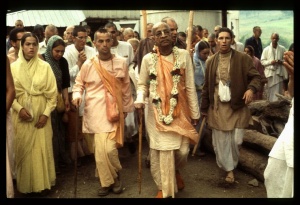CC Madhya 24.179 (1975): Difference between revisions
(Vanibot #0027: CCMirror - Mirror CC's 1996 edition to form a basis for 1975) |
(Vanibot #0020: VersionCompareLinker - added a link to the Version Compare feature) |
||
| Line 2: | Line 2: | ||
<div style="float:left">'''[[Sri Caitanya-caritamrta (1975)|Śrī Caitanya-caritāmṛta (1975)]] - [[CC Madhya (1975)|Madhya-līlā]] - [[CC Madhya 24 (1975)|Chapter 24: The Sixty-One Explanations of the Atmārāma Verse]]'''</div> | <div style="float:left">'''[[Sri Caitanya-caritamrta (1975)|Śrī Caitanya-caritāmṛta (1975)]] - [[CC Madhya (1975)|Madhya-līlā]] - [[CC Madhya 24 (1975)|Chapter 24: The Sixty-One Explanations of the Atmārāma Verse]]'''</div> | ||
<div style="float:right">[[File:Go-previous.png|link=CC Madhya 24.178 (1975)|Madhya-līlā 24.178]] '''[[CC Madhya 24.178 (1975)|Madhya-līlā 24.178]] - [[CC Madhya 24.180 (1975)|Madhya-līlā 24.180]]''' [[File:Go-next.png|link=CC Madhya 24.180 (1975)|Madhya-līlā 24.180]]</div> | <div style="float:right">[[File:Go-previous.png|link=CC Madhya 24.178 (1975)|Madhya-līlā 24.178]] '''[[CC Madhya 24.178 (1975)|Madhya-līlā 24.178]] - [[CC Madhya 24.180 (1975)|Madhya-līlā 24.180]]''' [[File:Go-next.png|link=CC Madhya 24.180 (1975)|Madhya-līlā 24.180]]</div> | ||
{{CompareVersions|CC|Madhya 24.179|CC 1975|CC 1996}} | |||
{{RandomImage}} | {{RandomImage}} | ||
==== TEXT 179 ==== | ==== TEXT 179 ==== | ||
<div class="verse"> | <div class="verse"> | ||
:kirāta-hūnāndhra-pulinda- | :kirāta-hūnāndhra-pulinda-pulkaśā | ||
:ābhīra-śumbhā yavanāḥ khaśādayaḥ | :ābhīra-śumbhā yavanāḥ khaśādayaḥ | ||
:ye | :ye 'nye ca pāpā yad-upāśrayāśrayāḥ | ||
:śudhyanti tasmai prabhaviṣṇave namaḥ | :śudhyanti tasmai prabhaviṣṇave namaḥ | ||
</div> | </div> | ||
| Line 20: | Line 19: | ||
<div class="synonyms"> | <div class="synonyms"> | ||
kirāta—the aborigines named Kirātas; hūna—the Hūnas; āndhra—Āndhras; pulinda—Pulindas; | kirāta—the aborigines named Kirātas; hūna—the Hūnas; āndhra—Āndhras; pulinda—Pulindas; pulkaśāḥ—Pulkaśas; ābhīra—Ābhīras; śumbhāḥ—Śumbhas; yavanāḥ—persons who do not follow the Vedic injunctions and who eat cow's flesh; khaśa-ādayaḥ—Khaśas and others; ye—those who; anye—similar others; ca—also; pāpāḥ—sinful persons; yat—of the Supreme Personality of Godhead; upāśraya—of the devotees; āśrayāḥ—taking shelter; śudhyanti—become purified; tasmai—unto Him, Lord Viṣṇu, because of whom they become purified; prabhaviṣṇave—to Lord Viṣṇu, the most powerful; namaḥ—respectful obeisances. | ||
</div> | </div> | ||
| Line 27: | Line 26: | ||
<div class="translation"> | <div class="translation"> | ||
" 'Kirāta, Hūna, Āndhra, Pulinda, Pulkaśa, Ābhīra, Śumbha, Yavana and the Khaśa races and even others who are addicted to sinful acts can be purified by taking shelter of the devotees of the Lord due to His being the supreme power. I beg to offer my respectful obeisances unto Him.' | |||
</div> | </div> | ||
Latest revision as of 15:16, 27 January 2020

A.C. Bhaktivedanta Swami Prabhupada
TEXT 179
- kirāta-hūnāndhra-pulinda-pulkaśā
- ābhīra-śumbhā yavanāḥ khaśādayaḥ
- ye 'nye ca pāpā yad-upāśrayāśrayāḥ
- śudhyanti tasmai prabhaviṣṇave namaḥ
SYNONYMS
kirāta—the aborigines named Kirātas; hūna—the Hūnas; āndhra—Āndhras; pulinda—Pulindas; pulkaśāḥ—Pulkaśas; ābhīra—Ābhīras; śumbhāḥ—Śumbhas; yavanāḥ—persons who do not follow the Vedic injunctions and who eat cow's flesh; khaśa-ādayaḥ—Khaśas and others; ye—those who; anye—similar others; ca—also; pāpāḥ—sinful persons; yat—of the Supreme Personality of Godhead; upāśraya—of the devotees; āśrayāḥ—taking shelter; śudhyanti—become purified; tasmai—unto Him, Lord Viṣṇu, because of whom they become purified; prabhaviṣṇave—to Lord Viṣṇu, the most powerful; namaḥ—respectful obeisances.
TRANSLATION
" 'Kirāta, Hūna, Āndhra, Pulinda, Pulkaśa, Ābhīra, Śumbha, Yavana and the Khaśa races and even others who are addicted to sinful acts can be purified by taking shelter of the devotees of the Lord due to His being the supreme power. I beg to offer my respectful obeisances unto Him.'
PURPORT
This is a quotation from Śrīmad-Bhāgavatam (SB 2.4.18). This verse was spoken by Śukadeva Gosvāmī when Parīkṣit Mahārāja asked him for a description of the creation. While offering obeisances to the Supreme Personality of Godhead, Śukadeva Gosvāmī described the unlimited potencies of Lord Viṣṇu, who can purify the lowborn creatures mentioned herein.